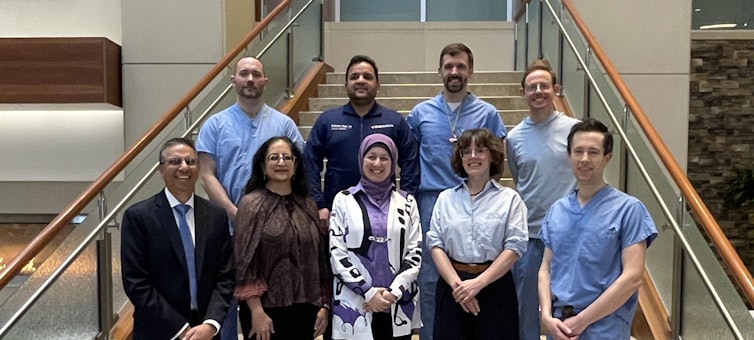GI and Colorectal Cancer
Gastrointestinal (GI) cancer and colorectal cancers are common. They affect thousands of Americans every year. Nearly 1,200 of these patients are West Virginians. Fortunately, these cancers are highly treatable when they’re detected early. That’s why, if you have one of these conditions, it’s important to have access to a team of GI specialists like the experts at the WVU Cancer Institute. We are committed to delivering personalized care that can meet your specific needs.
“As a group of specialists, we’re well positioned to give our patients the individualized, specialized colorectal and gastrointestinal care they need,” says colorectal surgeon Kevin Train, MD, who also serves as WVU Medicine Colorectal Surgery interim section chief. “We offer great continuity of care to each person. With us, they’re seeing the same providers consistently. And we approach each patient and their care from a unique perspective. It’s not one-size-fits-all.”
GI medical oncologist Nour Daboul, MD, credits the group’s collaborative approach with its ability to supply the highest quality, most convenient care.
“We give our patients with cancer the most up-to-date, multidisciplinary care,” she says. “In doing so, we help our patients receive cancer care close to home where they have the support of friends and family. They can avoid taking a journey to another state for services. It’s a privilege to be able to offer such complete care here.”
A Knowledgeable and Caring Team
At the WVU Cancer Institute, you can be confident you will receive the most advanced, high-quality care for your GI or colorectal cancer. Our team of board-certified or board-eligible specialists, led by Dr. Train, has the expertise to treat the full range of GI and colorectal diseases. We use leading-edge diagnostics alongside sophisticated technologies and procedures to treat every condition.
Our team of colorectal surgeons, GI oncologists, and radiation oncologists includes:
- Manga “Prashanti” Atluri, MD
- Miklos Auber, MD
- Nour Daboul, MD
- Muhammad Fareed, MD
- Emily Groves, MD
- Keri Mayers, DO
- Douglas Murken, MD
- Alex Ritter, MD
- Mohammad Shaikh, MD
- Kevin Train, MD
Our specialists also work closely with our advanced GI team for endoscopy services. This team performs complex minimally invasive procedures that can remove tumors or other obstructions:
State-of-the-Art Care
For our GI team, providing the highest level of care starts with screening services. We partner with 44 clinics across West Virginia to screen adults between ages 45 and 75 for colorectal cancer. If you receive abnormal screening results, we can refer you that day and schedule an appointment within a couple of weeks, Dr. Daboul says. During these visits, you will meet with our medical, radiation, and surgical oncologists; clinical trial specialists; genetic counselors; interventional radiologists; and social workers.
Experts on our multidisciplinary tumor boards meet weekly to discuss your case and design treatment plans that best meet your unique needs. In addition to providing the most common treatments for GI cancer, she says, we also offer several therapies that aren’t available elsewhere in the state. For example, we implant liver pumps that let us infuse chemotherapy directly into your liver. Our interventional radiology partners can also complete Y-90 procedures that inject a radioactive isotope into the blood vessels that support and feed your tumor.
Whenever possible, we perform minimally invasive laparoscopic procedures. With four of the state’s six colorectal surgeons on our team, Dr. Train says we have the expertise to complete the most complicated colorectal surgeries. These surgeries include colostomy reversals and perianal fistula repairs.
“As colorectal surgeons, we can readily provide specialized care for our patients who need surgical cancer treatment,” he says. “We are here for our patients who need surgical care for cancers that affect the organs in the colon, rectum and anus.”
Access to Innovative Care
Dr. Daboul says our experts are also deeply dedicated to creating the next generation of GI and colorectal cancer treatments. They participate in National Cancer Institute and National Institutes of Health clinical trials. And they build their own trials.
“We’re building protocols to fit our population,” she says. “For example, if I see a lot of patients with the same certain genetic mutations, we can create a trial for them.”
Currently, our experts are enrolling patients in trials designed to:
- Explore the impact of fasting or nutrition on chemotherapy effectiveness
- Investigate what factors may trigger the development of multiple primary cancers
- Test the efficacy of various immunotherapy and radiation combinations
Long-Term Support for Patients
Our commitment to your well-being doesn’t end with your surgery, your last chemotherapy or radiation session, or even when you’ve been cancer-free for five years. Instead, Dr. Daboul says, we closely monitor you to ensure your long-term health.
“Patients who are discharged from the clinic after five years of follow-up are often anxious about no longer having appointments every three or six months,” she says. “That’s why we created our Surveillance Clinic. It’s our way to bring our patients back in for periodic evaluations. They love it, and it significantly decreases their anxiety.”
During yearly visits to this physician assistant-led clinic, you discuss any symptoms, undergo bloodwork, and complete necessary advanced imaging. Clinic staff report abnormal results to your oncologist for timely intervention.
Reliable, Compassionate Care
Ultimately, Dr. Train says, it’s more than the sophisticated diagnostics and treatments that make the WVU Cancer Institute a destination for GI and colorectal cancer care. It’s also the emphasis we place on making sure you feel seen and heard.
“Our patients know the level of compassionate care they’re going to get when they come to us,” he says. “They feel appreciated as patients and receive the quality of service they deserve. It’s what I would want for my family members.”
